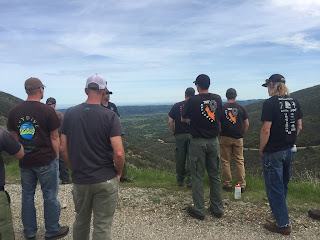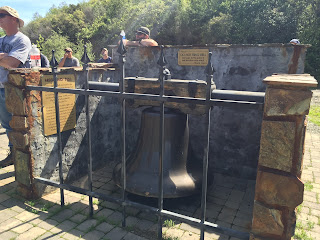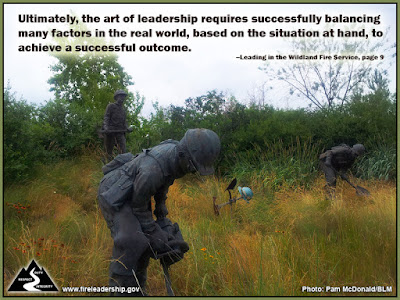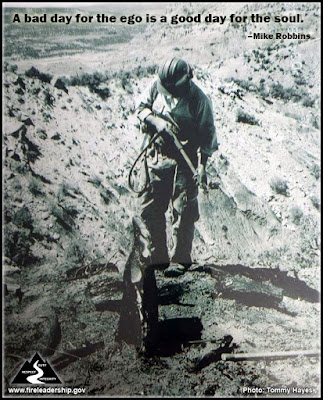Self-awareness is an inward application of situation awareness. Fire leaders have an inner drive to analyze and know ourselves. – Leading in the Wildland Fire Service, page 59
A forum where students of fire and leadership come together to discuss, debate and exchange leadership development concepts, experience, and thoughts with an intent to promote cultural change in the workforce and strengthen the wildland fire service and the communities they serve.
Thursday, April 28, 2016
IGNITE: Self-Awareness
Tuesday, April 26, 2016
NWCG Meets at TFS to Discuss Future of Wildland Fire Leadership
 |
| National Wildfire Coordinating Group’s Leadership Subcommittee in front of the Sanders Corps of Cadets Center on Texas A&M University; photo credit: Jessica Jackson |
Attendees were all members of the National Wildfire Coordinating Group’s Leadership Subcommittee, representing all facets of wildland fire from fire departments to state and federal agencies.
Monday, April 25, 2016
Thursday, April 21, 2016
IGNITE: Building Cohesive Teams
Fire leaders build cohesive teams—not simply groups of individuals putting forth individual efforts—to accomplish missions in high-risk environments. – Leading in the Wildland Fire Service, page 52
Labels:
Build the Team,
Crew Cohesion,
Food for Thought,
IGNITE
Tuesday, April 19, 2016
Honor & Learning - Rattlesnake Staff Ride
In preparation for the 2016 fire season, the Carson City District BLM took its entire fire staff to the Rattlesnake staff ride on the Mendocino National Forest. This idea came from the District’s operations group that was tasked to come up with a team building exercise to help prepare our on the ground leaders for the 2016 fire season. Justin Cutler, Assistant Superintendent for the Silver State Hotshots coordinated with the Mendocino Hotshots to make this happen. Chris Markey, Superintendent for the Mendocino Hotshots facilitated our staff ride.
What We Learned from the Rattlesnake Staff Ride
- Remembering and learning from history helps bring the importance of what we do closer to heart.
- Helped create District cohesion by going through the staff ride as a team.
- Helped see where we have been and where firefighting is now.
- Helped see the importance of good communication between resources.
- Helped show the importance of having clear escape routes to sufficient safety zones.
- Helped show the importance of being aware of local weather influences.
- Helped identify areas of focus for the 2016 fire season to bring back for our seasonal staff.
**********************************
A special thank you to Shane McDonald, Jon Palma, Justin Cutler, members of the Carson City District BLM and Chris Markey. All pictures are compliments of the Carson City District BLM.
For more information, check out the Rattlesnake fire in the Staff Ride Library.
Monday, April 18, 2016
IGNITE: Developing Your Subordinates
Exemplary leaders strive to create the conditions that make flow possible. That means they need to continually assess their constituents’ capacity to perform in the context of the challenges they face. Such assessment requires attention to the skills and the willpower of each person they lead. – Kouzes & Posner, The Leadership Challenge
Thursday, April 14, 2016
IGNITE: The Art of Leadership
Ultimately, the art of leadership requires successfully balancing many factors in the real world, based on the situation at hand, to achieve a successful outcome. – Leading in the Wildland Fire Service, page 9
Tuesday, April 12, 2016
Fitness Park to Memorialize Fallen Smokejumper
Howling wind and driving rain did not deter a group of northern California
firefighters and volunteers as they began work to develop a physical fitness
park being named in honor of a fallen smokejumper.
 |
| Luke Sheehy, a former member of the U. S. Forest Service Redding Smokejumpers and the BLM Diamond Mountain Hotshots, was killed in summer 2013 while fighting a fire in northeast California. |
Monday, April 11, 2016
IGNITE: Follower Facts
Follower Facts:
- Look for opportunities to excel and problems to solve
- Study the organization’s mission, vision and operations and look for new ways to fulfill them
- Success comes to those who take initiative, not to those who only wait for orders
– Don Mercer, Follow to Lead
Thursday, April 7, 2016
IGNITE: Duty-Bound to Act
Leaders in the wildland fire service are not only empowered but also duty-bound to act on a situation that is within our power to affect, even without direction from above. – Leading in the Wildland Fire Service, page 26
Wednesday, April 6, 2016
Wayback Wednesday: When the Pot Boiled Over (1959)
Check out the unity of effort by many agencies in the aftermath of fires and floods to bring resiliency to the Boise area.
Labels:
Remembered History,
Resilience,
Unity of Effort
Tuesday, April 5, 2016
Justin Vernon Receives Lead by Example Award
 |
| (2013 LBE Award winner Dr. Carl Seilstad presenting Justin Vernon his award; photo credit: Megan Cook) |
Boise Fire Module Crewmember
U.S. Forest Service
Honored for Motivation and Vision
Justin Vernon has been selected as one of the recipients for the 2015 Paul Gleason Lead by Example award. Four individuals from across the wildland fire service have been chosen to receive this national award.
 |
| (Vernon Family; photo credit: Megan Cook) |
The award was created by the NWCG Leadership Committee to remember Paul Gleason’s contributions to the wildland fire service. During a career spanning five decades, Paul was a dedicated student of fire, a teacher of fire, and a leader of firefighters. The intent of this award is to recognize individuals or groups who exhibit this same spirit and who exemplify the wildland fire leadership values and principles. Justin’s work in support of the Wildland Fire Leadership Development Program has been a demonstration of motivation and vision.
Justin was recognized for his ability to use contemplative writing to express deep thought into cultural issues within the fire service. Posts such as “The Value of Facing Irrational Fears” and “Breaking the Mold” have become springboards for others to talk about difficult topics in open forums or through quiet reflection.
Through his courage and willingness to share personal experiences, wildland firefighters are inspired to look introspectively to decide what type of firefighter or leader they would like to become. Justin's blog posts, as well as the books he recommends for the Professional Reading Program, bring leadership issues faced, but often not talked about, into meaningful conversation across the wildland fire service. His humble approach and candor through written expression and personal example exemplify the values of duty, respect and integrity.
Justin was recognized for his ability to use contemplative writing to express deep thought into cultural issues within the fire service. Posts such as “The Value of Facing Irrational Fears” and “Breaking the Mold” have become springboards for others to talk about difficult topics in open forums or through quiet reflection.
Through his courage and willingness to share personal experiences, wildland firefighters are inspired to look introspectively to decide what type of firefighter or leader they would like to become. Justin's blog posts, as well as the books he recommends for the Professional Reading Program, bring leadership issues faced, but often not talked about, into meaningful conversation across the wildland fire service. His humble approach and candor through written expression and personal example exemplify the values of duty, respect and integrity.
*************************
Check out Justin's blogs on the Wildland Fire Leadership Development blog and his personal blog Chasing Fire.
Monday, April 4, 2016
Women in Wildland Fire Mentoring
The Women in Wildland Fire program in southern Utah (sponsored by the Dixie, Fishlake, and Manti-La Sal NFs) needs your help in our participation in the 2016 Wildland Fire National Leadership Campaign - Never Stop Learning. We've made some modifications to our mentorship efforts and are hoping to provide mentors to all of our participants.
We're looking for folks to volunteer to be mentors to these first year AD firefighters. Our participants have little to no knowledge of wildland fire or the agencies that are sponsoring them. We aim for this mentorship to not only help bridge this gap but also provide diverse motivated examples of what they can achieve.
If you are interested in giving back please fill out the questionnaire no later than April 8, 2016 (http://bit.ly/WIWFmentor). The participants will have a chance to review the responses and choose a mentor they feel "fits" them at orientation April 9, 2016.
Mentoring is not restricting to particular agency affiliation, current employment status, or level of experience. Methods of communication and frequency are determined by the mentor and their mentee. Topics of discussion are between the mentor and the mentee but we do ask that if you see a violation of USFS policy (sexual harassment, EEO, unsafe practices, etc) to consider letting us know so we can help remedy the situation.
Feel free to pass this information along to others who may be interested in helping.
Thanks, WIWF of Southern Utah
*****************************
Women in Wildland Fire (WIWF) is a program dedicated to seeking out women with the characteristics and aptitude that will translate well to wildland firefighting. By providing initial wildland firefighting training and experience, WIWF aims to expose a more diverse set of qualified candidates to job and career possibilities they may not have known existed.
Friday, April 1, 2016
Leading Everyday - Drew Dudley TEDx
Here's a video I know that we've shared before, but it's been a few years and I wanted to put a new spin on it.
Sometimes in wildland fire we forget that leadership isn't strictly positional. It's all too easy to get sucked into the traditional mindset that Leadership (with a capital "L") is mostly related to your position and your job, and not your everyday, mundane actions. Being a leader is about running a program, supervising a crew, or leading a squad, or so the story goes. We tell people to "step up and be a leader," and typically make a big deal about who's in charge.
It's a shame in some ways that leadership has become such a "big deal," as it sometimes becomes something we don't think we can fit in our daily routines. It becomes something we switch on and off when we need to, when we're in "leadership" roles, or when it's expected of us. I've even heard coworkers say they don't want to "do leadership" because it sounds like a lot of extra work. But what if it wasn't that way?
Leadership is about influence, and we have enormous potential to be influential every day, without making a extra effort to be a "Leader." As pointed out in the video, it's possible that our everyday actions can change someone's life for better, or worse, and we might not even remember it. Think back in your own fire career, and think of the small actions of others that seemed large to you... I know I've had a lot of those moments, when someone took a moment to help with a problem I was having, or encouraged me to take that next step, whatever it was. Many small actions add up, especially over the course of ten or twenty years.
If we step back and think of this everyday aspect of leadership, suddenly we're all leaders, and we're all capable of contributing to making a better organization, and a better crew, forest, unit, or whatever. Think of the small ways that you can be a leader every day. Take a moment to mentor the new guy on the crew instead making life harder. Say a kind word when you pass a coworker who's working hard on a project, or even jump in and offer to lend a hand for a few minutes. Treat those around you with the respect you want to be treated with, and they'll remember. Pass on small acts of leadership kindness - pay it forward.
I'm an introverted person - I've written about it before here - and everyday leadership is something that introverts like me can practice pretty easily. As an introvert, I'm really good at noticing and acting on small things, the little details, and those small things are crucial to the hundreds and thousands of little actions that make up everyday leadership. I know that I personally feel more satisfaction from doing the little things right in the background, unnoticed, than when I do the "big" things right. Maybe you, or some of those you work with, feel the same.
Leadership doesn't have to be a big production in and of itself; it can be a small part of your everyday life. Maybe it already is. Just doing the little things right, every day, can have a huge influence on those around you. Think of everyday leadership, doing those little things, as building a foundation that will support you when you do "step up" into those Leadership (with a capital "L") roles, whether it's long term or just for an hour or a day. By focusing on our everyday actions we can not only set ourselves up for success, but enable those around us to be successful as well, and to me, that's an important part of being a leader, no matter your position.
Until next time...
************************************************************
Justin Vernon is a regular guest contributor on our blog. Justin works for the United States Forest Service and is a member of the NWCG Leadership Subcommittee as the steward of the Professional Reading Program. Check out his Chasing Fire blog. All expressions are those of the author.
Subscribe to:
Posts (Atom)















